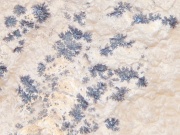Manganese (Inventory)/Dendrite
From LagWiki
(Added some references) |
(Link to glossary) |
||
| Line 2: | Line 2: | ||
The '''Dendrite''' field of the [[Manganese (Inventory)|Manganese]] section should be used to record any appearance of manganese dendrites. | The '''Dendrite''' field of the [[Manganese (Inventory)|Manganese]] section should be used to record any appearance of manganese dendrites. | ||
| - | Manganese dendrites appear most often as tiny, scattered, black or dark purple dots on [[Calcite (Inventory)|calcite]] or bedrock, and especially on [[Calcite (Inventory)/Calcite Coating|calcite coatings]] over limestone bedrock. When more developed, they can appear as dark, fractal, fern-like shapes. The size can vary greatly from tiny specks to larger organized areas. Examine exposed bedrock and calcite, especially coatings on bedrock for the tell-tale dark dots which indicate manganese dendrites. A close examination is often required. | + | Manganese dendrites appear most often as tiny, scattered, black or dark purple dots on [[Calcite (Inventory)|calcite]] or bedrock, and especially on [[Calcite (Inventory)/Calcite Coating|calcite coatings]] over limestone bedrock. When more developed, they can appear as dark, [[Glossary (Inventory)#Fractal|fractal]], fern-like shapes. The size can vary greatly from tiny specks to larger organized areas. Examine exposed bedrock and calcite, especially coatings on bedrock for the tell-tale dark dots which indicate manganese dendrites. A close examination is often required. |
Manganese dendrites are actually a form of manganese oxide (and sometimes iron). The fractal shapes may be an indication of biological influence from iron and manganese oxidizing bacteria. Manganese dendrites could be mistaken for fossils because the branching pattern may look like leaves. | Manganese dendrites are actually a form of manganese oxide (and sometimes iron). The fractal shapes may be an indication of biological influence from iron and manganese oxidizing bacteria. Manganese dendrites could be mistaken for fossils because the branching pattern may look like leaves. | ||
Revision as of 13:33, 24 January 2012
The Dendrite field of the Manganese section should be used to record any appearance of manganese dendrites.
Manganese dendrites appear most often as tiny, scattered, black or dark purple dots on calcite or bedrock, and especially on calcite coatings over limestone bedrock. When more developed, they can appear as dark, fractal, fern-like shapes. The size can vary greatly from tiny specks to larger organized areas. Examine exposed bedrock and calcite, especially coatings on bedrock for the tell-tale dark dots which indicate manganese dendrites. A close examination is often required.
Manganese dendrites are actually a form of manganese oxide (and sometimes iron). The fractal shapes may be an indication of biological influence from iron and manganese oxidizing bacteria. Manganese dendrites could be mistaken for fossils because the branching pattern may look like leaves.
References
- Potter, Russell M. and Rossman, George R.. Mineralogy of manganese dendrites and coatings. American Mineralogist, Volume 64, pages 1219-1226, 1979: http://www.minsocam.org/ammin/AM64/AM64_1219.pdf
- Pseudofossils; Dendrites. Arkansas Geological Survey: http://www.geology.ar.gov/geology/pseudofossils.htm

